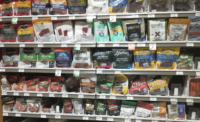Keeping it Natural
BY TOM WRAY, ASSOCIATE EDITOR
Alison’s Family Farms strive to stay small and focus on quality.
Natural chicken is becoming more and more popular. At one time, natural products were the market of small independent stores and producers. Now, larger chains and producers have stepped into the market.
Alison’s Family Farms has made it a point to stay (relatively) small and natural. The small company, based in Troy, N.C., produces naturally raised chicken and turkeys at its farms.
Bruce Cuddy, the owner and founder of Alison’s Family Farms, has been in the poultry business for almost 37 years. He clarifies that the company produces “natural” poultry products, not “organic” ones.
“We don’t use organic feed, but we follow all the other rules as if they were organically fed,” he explains. The feed is all-vegetable and there are no growth hormones, medications or animal byproducts in the raising of the animals.
The company stresses humane treatment of the poultry. “Most poultry operations are what I call factory farms,” Cuddy says. “They pack in as many [birds] as they can.” Alison’s uses buildings that give the birds more room to move around freely as they are raised. And when the full-grown birds are sent to the plant for processing, the cages are large enough to allow the birds to breathe and be moved without being stressed. They’re even handed to plant workers, rather than just dumped into the receiving line.
Staying natural
The biggest reason the company has not become fully organic comes down to cost. Cuddy says that the cost of organic feed can be three times as much as regular feed. The company couldn’t justify the cost against the demand they have seen for organic poultry.
The company also has done its part to help promote sustainable agriculture. Cuddy says that by the most strict definition, its own farms for turkey raising aren’t self-sustaining since they don’t feed the poultry from what’s grown on the property. But they do rely on local farms that make a point to recycle manure as a fertilizer.
All the products, turkey and chicken, are processed using an air-chilling process. “We use half the water other plants use,” he states.
Air-chilling is still relatively rare in the United States, but it is used more often in Europe. Instead of using chilled-water baths, Alison Farms uses fresh refrigerated air to lower the temperature of the carcass. By using this process, the poultry doesn’t absorb water and has a lower risk of cross-contamination. The company believes that it is a part of sustainable agriculture because of the reduction of water that needs to be used and treated.
Alison’s Family Farms has been able to keep control of the whole process since 2006, when its own processing plant was finished. Until that point, Cuddy says, custom packers had processed the birds.
All of the products from the company are certified to be humane. The certification is established by Humane Farm Animal Care, an organization dedicated to humane treatment of livestock. The label means that all of the methods for raising poultry on the farm have been proven to be with the welfare of the birds in mind. The company had to meet objective standards to receive the certification.
The company started when Cuddy left the family business, Cuddy Farms in Ontario, Canada, to start his own company, Elite Foods LLC. Already interested in natural foods, he saw raising and producing natural poultry products as a way to compete with large companies and put out a quality product.
Those products range from basic chicken products, such as tenders, thighs and drumsticks, to a variety of turkey products. Whole fresh or frozen turkeys are available from the company, as are applewood smoked turkey bacon, honey smoked deli breast and honey roasted deli breast rubbed with natural spice.
Niche market
The company started by exploiting natural products as a niche market, working with smaller retail sites. As the market grew, so did Alison’s Family Farms. The company’s products are now in good-sized regional chains that have strong natural food programs.
“Our foodservice area is really growing too,” continues Cuddy. “We’re getting interest from high-end restaurants. As a mater of fact, we’re on the menu of quite a few of the white-tablecloth restaurants in the Carolinas.”
The brand name Alison’s Family Farms comes from his middle daughter, Alison. She is a veterinarian and a supporter of natural foods. As Bruce was establishing the company, he wanted a brand name that would attract younger consumers and women, especially those looking for natural products. And rather than try to adapt the Cuddy family name, already being used for another company, Cuddy says Alison was a nice wholesome name that sent the message he wanted.
He came to Troy at the advice of his bankers. A facility was available that the company could use as a starting point for its own needs. Cuddy has lived in the area since 1970, so it was a natural fit.
The company has made a point to stay small. “We don’t want to go too far away from home,” he says. “Freight is a big factor, so we’re trying to stay as close to home as possible.” The stores where Alison’s Family Farms products are located hug the East Coast from Maine to Florida. The furthest west the company distributes its products is Tennessee.
“We don’t want to get big, just be able to handle our customers and put out a good product and be profitable,” Cuddy says. “If you put out a quality product, the customers will come to you.”
ALISON’S FAMILY FARMS
Founded in 2006
Headquarters: Troy, N.C.
Employees: 160, depending on season
Plants: 1
Brands: Alison’s Family Farms
Headquarters: Troy, N.C.
Employees: 160, depending on season
Plants: 1
Brands: Alison’s Family Farms





